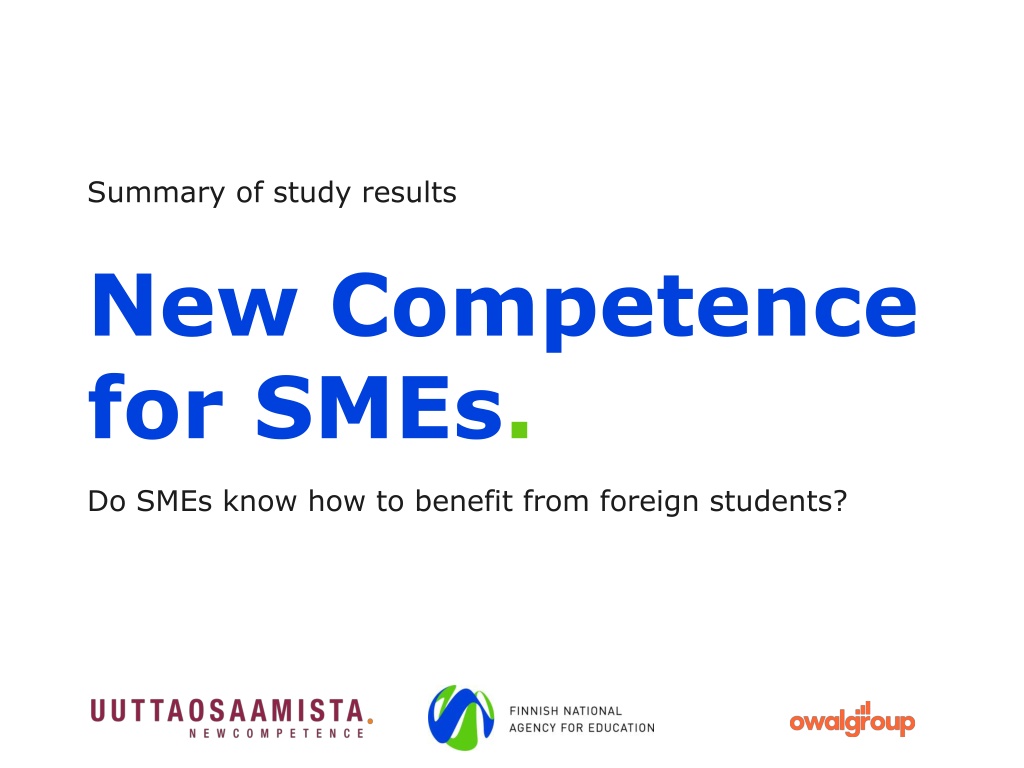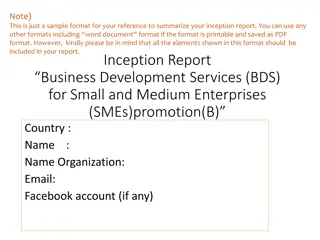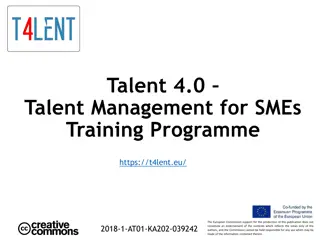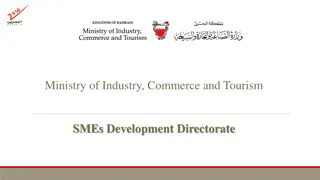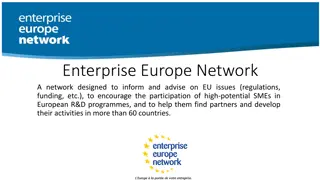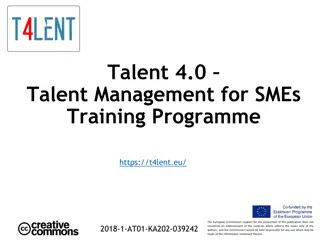Understanding SMEs' Engagement with International Talents
Investigating the utilization of international talents by SMEs and exploring benefits, challenges, and solutions. Findings reveal that hosting foreign students is beneficial for growth-oriented SMEs across various sectors, with English being a common working language. Companies of different sizes have hosted students, contributing to internationalization and job creation. Suggestions are made to enhance SMEs' capacity to leverage international talents for business development.
Download Presentation

Please find below an Image/Link to download the presentation.
The content on the website is provided AS IS for your information and personal use only. It may not be sold, licensed, or shared on other websites without obtaining consent from the author. Download presentation by click this link. If you encounter any issues during the download, it is possible that the publisher has removed the file from their server.
E N D
Presentation Transcript
Summary of study results New Competence for SMEs. Do SMEs know how to benefit from foreign students?
Contents Introduction International talents in SMEs The report in a nutshell. Slide 3 Background data on participating SMEs. Slides 4-5 Results Messages to institutions Answers to the questions of why, how, what benefits, and what challenges? Development proposals from companies to educational institutions Slides 7-13 Slides 14-18
Introduction Why the New Competence -project? CIMO wished to investigate if SMEs utilise the competence of foreign HE and VET trainees as well as foreign students graduating from Finnish higher education institutions? the benefits and challenges encountered by companies and solutions found to the challenges. SMEs create jobs, and internationalisation is a key pathway to growth. The project was underpinned by the assumption that international talents are an underused resource. The objective is to lower the threshold for SMEs to host international talents. Data collection in spring and autumn 2016: An electronic survey among SMEs and company interviews were used as key material. A literature review of previous studies and reports was also carried out. Other data and materials The website www.uuttaosaamista.fi contains a more extensive version of the publication (in Finnish), videos describing companies experiences as well as a set of slides for educational institutions, stakeholders and companies on the possibilities of benefitting from international talents (in Finnish and in English). 3
International talents in SMEs? Has the company hosted foreign students? Yes (N 125) 17% A total of 386 SMEs responded to the survey conducted as part of the study. 32% No (N 196) No, but we have had other international employees (N 65) 51% 32% of the respondents had hosted international talents: 64% had hosted foreign higher education students, 43% foreign VET students, and 7% both. Foreign HEI graduate recruited: 26% In most cases, the companies had hosted two students. Two larger companies had received up to 200 students. total 64% HEI student from abroad as a trainee: 29% Foreign HEI degree student as a trainee: The most common period in which companies had hosted students was 2014-2016 (77%). 31% VET student from abroad for a work placement: 43% 4 4
Compared to SMEs that had not hosted international talents, SMEs that had hosted them: Contain a higher share of growth- oriented and international companies. In almost all of the companies, English is one of the working languages. Also include a slightly higher share of older companies. Companies of all sizes have hosted students. The greatest numbers of students had been working in companies with 5-49 employees. Almost all sectors were represented. Mostly, the students had been working in the service, industrial, information and communication, and hotel and catering sector as well as in wholesale and retail companies. Profiling of respondents: The company has hosted international talents The company has not hosted international talents % % Share of companies with international operations 0 % 100 % 26 47 Share of strongly growth-oriented companies 25 0% 100% 32 One of the working languages is English 82 49 0% 100% The company has also hosted a Finnish HE trainee / VET student on work placement 69 91 0% 100% 5
Companies with international talents: Results: Why had the company hosted international talents? Higher education VET 40% A person s international background does not matter 40% 25% We wished to carry our corporate social responsibility 37% 38% The student had special competence 33% 43% An extra pair of hands for productive work 30% 15% Competence for developing new products and/or services 23% 12% Competence for finding and managing intl. customers in Finland 12% 26% Competence for import or export trade or for a new market area 9% 5% Competence for international subcontracting 7% 3% We needed an employee for a branch located abroad 2% 6
Companies with international talents: Results: How did the company find the international talent? VET student Higher education student 57% 47% 35% 32% 30% 28% 26% 20% 7% 7% The student contacted the company directly Established cooperation with the education institution The company was contacted by an educational institution (no established cooperation) We actively sought international talents for our company We were contacted by some other network or actor 7
Companies with international talents: Benefits brought to companies by international talents by level of education Experience of benefits %* Results: VET student Higher education student % % The international talents managed their tasks just as well as our other employees 95 95 The international talent had a positive effect on our operating culture 83 90 We improved our induction training 76 88 The international talent brought new viewpoints to our company 85 81 The international talent brought a competitive advantage by contributing a new type of competence to our company 63 77 100 We found growth opportunities in a new market area 28 41 The international talent helped us in establishing useful new contacts 54 51 * Was useful to some extent extremely useful 8
Companies with international talents: Companies motives for hosting international talents: Results: On the basis of data on the companies motives for hosting international talents, different profiles were modelled. These motives partly overlap. Aiming abroad Aiming abroad companies wanted to draw on the students skills to support their internationalisation. Talent hunters often already are international companies, and the talent's background thus makes no difference. What matters is their competence and potential. Internationali- sation at home Talent hunters Internationalisation at home companies had hosted an international talent as an extra pair of hands, or maybe to strengthen their competence in serving foreign customers. Corporate social responsibility Corporate social responsibility companies hosted international talents when requested to do so as an additional resource or to improve the employees linguistic and cultural skills. 9
Companies with international talents: Results: Benefits brought by international talents to companies examined by the company's motive: Corporate social responsibility % Internationali- sation at home Aiming abroad Talent Hunters Experience of benefits %* % The international talents managed their tasks just as well as our other employees 100 96 93 95 The international talent had a positive effect on our operating culture 100 96 90 82 We improved our induction training 88 88 78 89 The international talent brought new viewpoints to our company 96 97 82 80 The international talent brought competitive advantage through new type of competence 91 100 63 57 We found growth opportunities in a new market area 25 81 27 52 The international talent helped us establish useful new contacts 81 69 56 50 * Was useful to some extent extremely useful 10
Companies with international talents: Results: Challenges experienced by companies Average 1 (none) 4 (very many) The most common challenges encountered by companies that hosted foreign VET students for work placement were inadequate resources for guiding the student and the lack of a common language. 1,7 1,7 1,6 1,5 1,4 1,3 For companies that hosted higher education students, inadequate resources for guiding the student and challenges arising from differences in working cultures were somewhat more common. Inadequate resources for guidance Lack of common language Challenges arising from differences in work cultures Challenges arising from cultural differences Difficulty in transferring competence to others Difficulty in integrating the intl. talent in the work community 11
Companies with no international talents Results: Companies with no international talents Why not hosted international talents? Companies could need the additional resources and special competence brought by an international talent in the future. About one out of four believed that they could use international talents to support their internationalisation. Intl. talents have not applied: 47 % No need for trainees: 33 % The background of the student does not matter: 23 % Insufficient language skills: 22 % Not now, but maybe in the future? The most common reason for the companies not hosting international talents was that the companies and the students had failed to meet, or the company had no need for trainees in general. An extra pair of hands for productive work: 43 % Special competence: 28 % To support internationalisation: 26 % Breakdown of to support foreign trade or when entering a new market area : companies with international operations 47%, with national operations 39% and with local operations 6%. 12 12
All companies Results: What type of support is required from educational institutions? Companies would like more information about the possibilities of hosting and benefitting from international talents What type of support would you need from educational institutions? Company has not hosted intl. talents Company has hosted intl. talents More information about the possibilities of hosting students: 26 % 48 % Among companies that have hosted international talents, the ones that had hosted higher education students, in particular, appeared to have less need for support. Support for language problems: 20 % 40 % Support in charting suitable tasks: 18 % 31 % Support in guiding the students: Companies that have hosted foreign VET students have received more support from educational institutions. 19 % 24 % 13
Key messages to educational institutions Information about possibilities Business cooperation Communicate about how international talents competence can be utilised. Market the benefits and make them visible. Operate as bridge-builders, listening to the companies: company visits, invitations, fairs, recruitment meetings - there are many ways of doing this. Companies are different, which should be taken into account in the cooperation. Better matches in recruitment Developing guidance and instruction Matching international talents with companies is based on knowing the persons. How can you facilitate this? Career guidance and linguistic studies should have closer links with everyday life. The students should have more capabilities for making their competence visible.
Information about possibilities A relatively large share of companies do not know enough about the possibilities of hosting and benefitting from international talents. Some of the SMEs that have hosted students also find that the cooperation is sporadic. Clear communication about foreign students and the possibilities is needed. While entrepreneurs appreciate being contacted directly by the students, awareness of recruiting international talents should be raised among both entrepreneurs and students. Questions to consider: In what forums and on what media do you communicate about utilising foreign students for the companies needs? How accessible is this information? Companies need different talents for different needs: do you target your information and offer services responding to those different needs? Do you work together with other education providers in the area, for example in the sphere of information activities? Do you utilise regional partners and networks? Do you work together with regional entrepreneurs organisations, business companies or the Chamber of Commerce? Do you cooperate with other education providers in the area, for example when approaching stakeholders?
Business cooperation and business life development In business cooperation and RDI, internationalisation should be a competitive advantage that can be supported by matching international talents with companies. Practices of working life cooperation should be harmonised and designed to respond to company needs. There are plenty of methods for business cooperation, and companies should thus be listened to when using them. Questions to consider: Are your practices of working life cooperation harmonised and clear? Are they also implemented at the level of teachers? Have they been communicated to companies and stakeholders? Do clear practical opportunities and forms exist for the working life cooperation? Are alumni used in business and stakeholder cooperation? Have the needs and possibilities of hosting foreign students been identified in regional development plans? Have they links to regional business development? How is this seen in practice? Does the training of workplace supervisors in VET include the guidance of foreign students in work placement?
Better matches in recruitment Companies would like students and employers to be brought together; this should also be taken into consideration in recruitment services and working life cooperation. If necessary, vocational institutions and HEIs should analyse the tasks together with the employer and provide support for the company. Questions to consider: How do your practices of recruitment and working life cooperation help to bring international talents and companies together? Do you have systematic methods and opportunities for company visits, fairs, projects, recruitment meetings or other practices of communicating information from companies to students and vice versa? Has information about these been disseminated. Have they been productised? How is information about the talents communicated between international coordinators, working life cooperation and RDI actors as well as teachers? Is the information communicated about the student and his or her competence sufficient? Is the student able to identify the special competence he or she has to offer for the company (and the competence he or she will gain through the work experience)? Are companies provided with sufficient support? Have the rules and responsibilities been specified together?
Developing guidance and instruction Mastery of the working life language and professional vocabulary is appreciated, and it should be highlighted, especially in language studies for degree students. This would also require additional focus on supervising traineeships on the part of the higher education institution. Providing students with working life skills and capabilities is also important when aiming for the Finnish labour market. Questions to consider: Does your educational offering contain sufficient instruction in the Finnish language for foreigners? Has its content been examined from the perspective of working life needs? Have learning the language and Finnish working life practices been included in the objectives of the student s traineeship? Do the studies prepare the student sufficiently for the Finnish working life and work culture? E.g. plain speaking and bringing up issues are appreciated by companies. How can the student build capabilities for marketing his or her competence? How is this supported?
